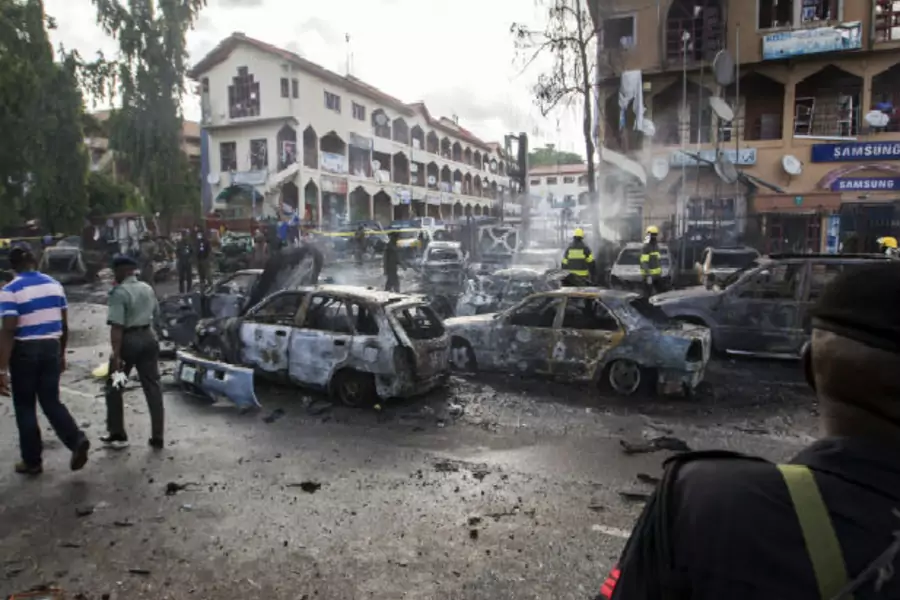More on:
This is a guest post by Jim Sanders, a career, now retired, West Africa watcher for various federal agencies. The views expressed below are his personal views and do not reflect those of his former employers.
In his July 24 blog post, John Campbell referred to the “civil war within Islam in northern Nigeria.” There may be a slightly different way to view the events of which he writes. It’s credible to say that there is a civil war within Islam in northern Nigeria, but such claims also play into the hands of those who have long denied the seriousness of Boko Haram and its dire implications for Nigeria as a whole.
From Boko Haram’s beginning as a movement until the Chibok kidnapping, the Nigerian government and many others viewed the phenomenon as: a problem in the remote northeast; a violent group that is marginal to the country’s main players and constituencies; or a blip on the radar screen of more well-known and threatening terrorist groups globally. In other words, nothing that really affected Nigeria’s national integrity.
Those Nigerians and outside observers who have thought of Boko Haram as marginal can draw on comments like “civil war within Islam in northern Nigeria” as a justification for their own avoidance of the problem. The unspoken assumption is, therefore, that Boko Haram is isolated, contained, and thus minor. All manner of mental gymnastics will be performed to sustain this kind of denial.
But the reality is a lot different. First, Abuja’s role in Boko Haram’s origins is enormous, so it has been a national (if unrecognized) issue from the outset. It is also important to note that despite Muhammadu Buhari’s criticism of the group, the attempt on his life could easily have been carried out by his traditional political opponents, who, given Boko Haram’s high profile, anticipated that the blame would fall on the group. What better time to try to eliminate an opponent than when a group with a track record of murder is at large in the area and will likely be blamed? Nigeria’s “democratic” national election seasons typically begin with an unofficial “primary” in which political rivals narrow the playing field by trying to kill each other. We are now well into that political murder season. Boko Haram, in contrast, does not care about elections. Polls are irrelevant in their world view. If they did attack Buhari, it is more likely to have been on the basis of his reputation as a traditional Muslim leader than a political candidate.
But there are more layers to the Nigerian crises that can’t be understood very well by conventional ways of seeing. The academic concept of “post-modernism,” not normally discussed by those interested in security, does seem to accurately describe aspects of some present-day phenomena, Boko Haram included. The term is used to describe a situation in which organizations construct their own reality and act accordingly, often to the utter disbelief of those watching them.
Oddly enough, the Boko Haram discussion reminds me of Amazon.com’s conference call on July 24, in which CEO Jeff Bezos announced second-quarter losses of $126 million, or seventeen cents a share. Many on Wall Street expressed horror at the announcement, asking why the company showed no interest whatsoever in reducing spending in order to achieve profitability.
As a result of the call, Amazon’s share price dipped 10 percent. But Amazon simply does not care that much about its share price; it does care deeply about its long-term objective of dominating global retail, and is determined to do what it takes to get there. One need only look at the company’s 1997 Letter to Shareholders to understand its guiding philosophy. It will take losses, operate in the red, and “press on regardless.”
Similarly, Boko Haram does not operate according to anyone else’s playbook. This is one reason why some observers think they are stupid. There is no one to negotiate with, they complain. That’s because Boko Haram doesn’t want to negotiate. They intend to move forward, regardless. They are not deterred by losing men in battle; they just keep pressing on. Nor, like ISIS, do they care about national borders. They have created their own reality, an amalgam, as John Campbell says, of twenty-first century technology and esoteric (medieval) Islamic texts, which they hold up as guiding documents. Journalist Alex Perry’s account of Lamido Sanusi’s explanation of reality in Nigeria—“to understand Nigeria…you must throw away notions like certainty and consensus”—dovetails with the view of Boko Haram as a group that creates its own reality.
All of this means our current policy approach is stuck in the old, modern world where democracy was viewed as an absolute and elections were seen as the pathway to the end of human history. (Apologies, Mr. Fukuyama.)
More on:
 Online Store
Online Store
